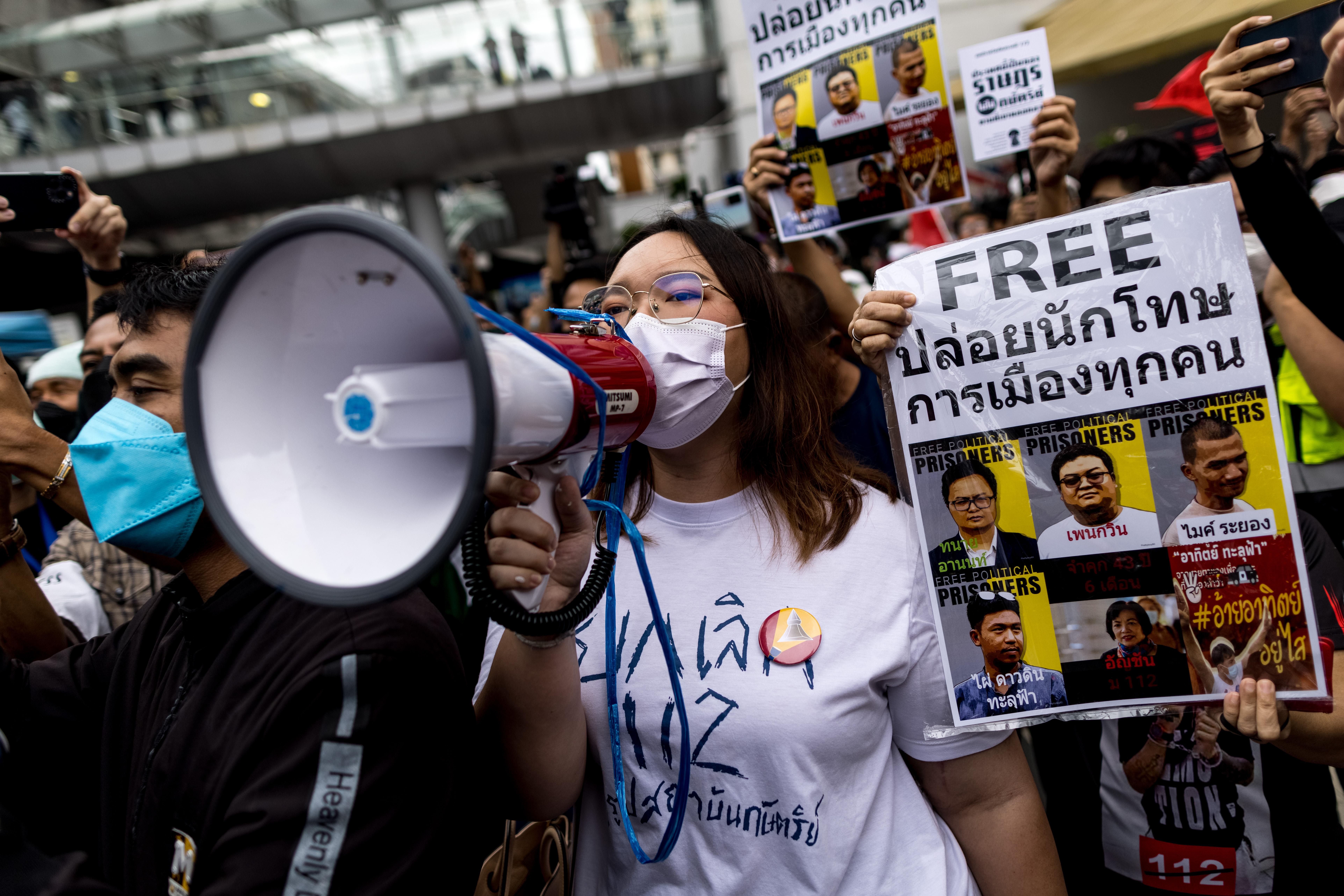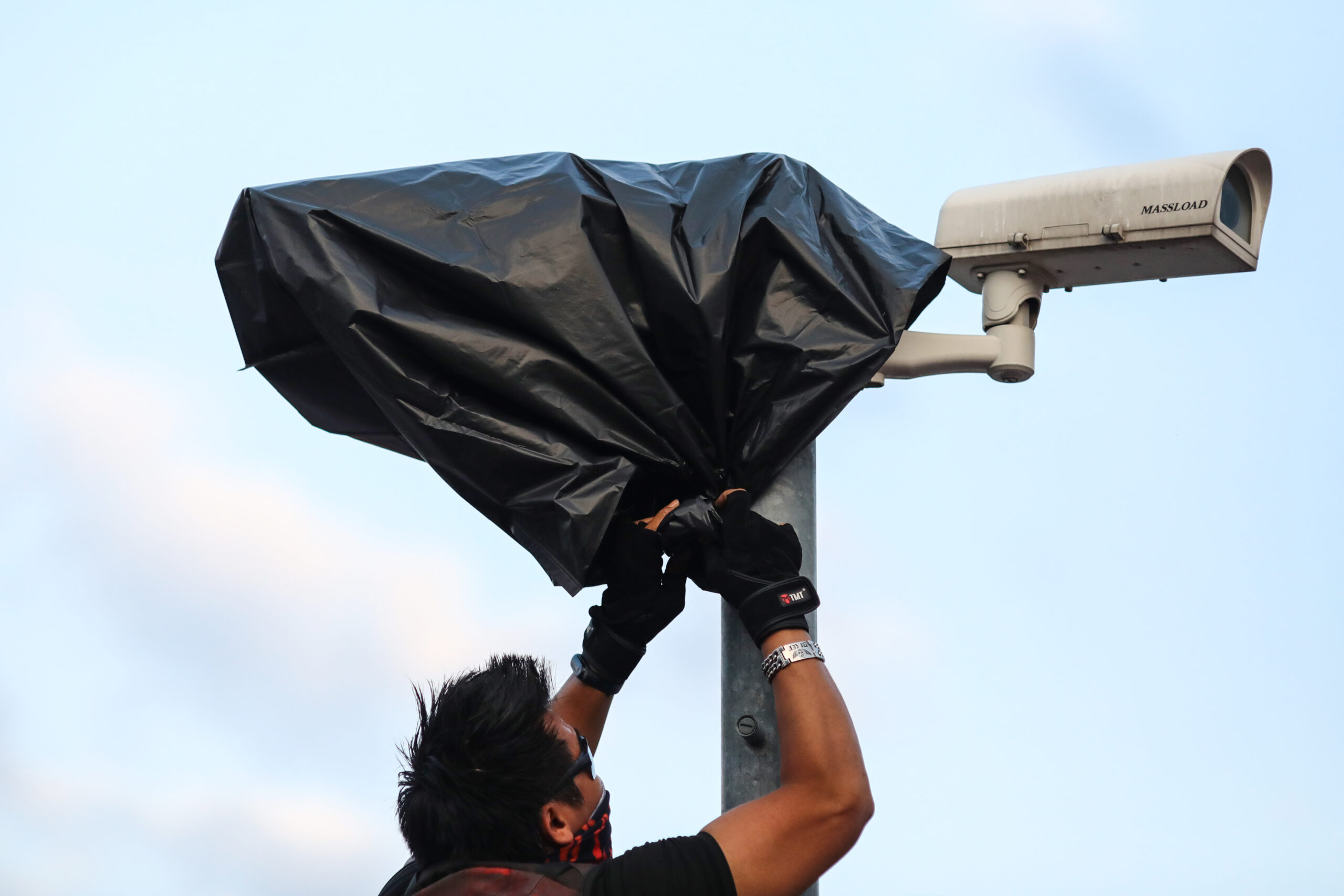Narin Kulpongsathron, a 33-year old activist, was recently convicted under Article 112 of the Thai Criminal Code on March 4 for defacing a portrait of Thailand’s King Vajiralongkorn. Otherwise known as lèse majesté, which prohibits the defamation of the Thai royal family, convictions can come with sentences of up to 15 years. His was related to a pro-reform protest in September 2020, on the anniversary of the military coup d’état that overthrew former Prime Minister Thaksin Shinawatra.
At its core, lèse majesté is a legal weapon Thai authorities have used repeatedly to silence dissent, evidenced by charges thrown at opposition leader Thanathorn Juangroongruangkit or the brutal 43-year sentence handed to a former civil servant for posting clips to Facebook and YouTube critical of the monarchy. Lèse majesté has become so feared in Thailand that governments have issued travel warnings to citizens asking them to watch what they say, or even type.
In November 2021 Thailand’s Constitutional Court ruled that calls for monarchical reform by three protest leaders, Panusaya Sithijirawattanakul, Arnon Nampa and Panupong “Mike” Jadnok, were equivalent to an attempt to overthrow the political system and that mass protest speeches made by the trio beginning in 2020 were unconstitutional. The ruling could pave the way for treason charges, which could carry the death penalty.
Lèse majesté in Thailand is causing more personal destruction than ever before. For protesters in Thailand, the reality is that risks associated with general mass mobilisation or open defiance of political authority—including the monarchy—are so severe that a digital and authoritarian impasse must be broken.
Since November 2020, 173 people have been charged, most from online political speech or participation in demonstrations. In 2020, a 16-year-old child was accused of committing lèse majesté after the administrator of a popular Facebook page filed a police complaint against him. In 2017, 14-year-old Abhisit Chailee was detained without legal counsel for setting fire to a portrait of the late King Bhumibol Adulyadej.
If children can be charged under Article 112, the bar for prosecution for other activists is now dangerously low. Although Thailand is a party to the Convention on the Rights of the Child (CRC), which legally defines childhood as lasting until age 18 and decrees that arrest, detention or imprisonment of a minor child should be a measure of last resort, the Kingdom considers lèse majesté a threat to its “national security” thereby skirting the spirit of the convention.
While activists like 20-year-old Tawan Tantawan are becoming more creative in the way protests are conducted, such as tying hundreds of red ribbons to the handrails or seats of Skytrains, these small acts of rebellion are not altering the scale of consequences handed down by authorities. Before risks can be lowered, protests must move into the realm of the anonymous, and a level of protection must be granted by social media companies to protect online speech, as well as the identities of users.

There is precedent for action. Facebook responded to public pressure and legal action caused by potential negligence and removed many of its accounts controlled by the junta, as well as the main page of the Tatmadaw, Myanmar’s military, when faced with a near $200 billion dollar lawsuit which alleged that their algorithms amplified hate speech and fuelled the persecution and mass murder of Rohingya Muslims in Myanmar.
The social media giant also updated its application to allow people to lock their profiles, a significant development in Myanmar, a country where the platform is a main conduit for news and information sharing. The same action was taken after the Taliban takeover in Afghanistan last year. Users in Thailand do not yet have this option.
Thailand’s military-backed government has a love-hate relationship with social media giants. In 2017, the Prayut government threatened to ban Facebook after the Army Cyber Centre (ACC), established in 2015 to protect the monarchy online, identified more than 800 online activities that allegedly impacted the monarchy, of which more than 350 were committed via Facebook. It later backed off on that threat.
The Thai government was later caught inflating accounts belonging to the military which targeted users in the southern Thai provinces, where a long standing insurgency lingers. Facebook removed more than 70 Facebook accounts for what it defined as “coordinated inauthentic behaviour on behalf of a government entity”, but blocked Pavin Chachavalpongpun’s Royalist Marketplace, a page with over 1 million followers after a threat from the government.
The reality is that governments have simply attempted to co-opt social media platforms for a variety of reasons.
Mass surveillance is no longer the priority of a small repressive few, like China or Iran. Merely being online and expressing legitimate political opinion makes users vulnerable on social media. Thailand, for example, has been using Pegasus spyware to eavesdrop on dissidents.
If social media platforms won’t agree to a standard of practice governing the rights of users, citizens will not be able to adequately protect themselves from their own governments. Mass surveillance by governments has allowed authoritarian regimes to track dissidents and inflame tensions against ethnic minorities. As the cost of online surveillance gets lower due to a plethora of advanced technologies available, the likelihood of abuse increases.
An increasing number of governments have tried to rationalise their surveillance efforts under the banners of national security, counter-terrorism, the restoration of the rule of law, and the limitation of disinformation online. The reality is that governments have simply attempted to co-opt social media platforms for a variety of reasons.
And where social media platforms like Facebook try to view their applications as integral to private life and the building of online communities, governments increasingly view the private information stored on private servers as raw data that can be collected, analysed, and then used in subsequent prosecutorial efforts.
In the first half of 2019, Facebook reported that government requests for user data increased 16% from 110,634 requests to 128,617. Facebook has in the past tried to reassure the Thai people that user data was not shared with the government.
Social media companies have made early decisions to protect the speech and identities of individuals protesting and expressing opinions only against malevolent governments, such as that in Myanmar. They should also nurture this environment in Thailand where users are allowed protection from governments using draconian laws as a means of political repression.

Internet users are caught in a vicious cycle, between deeply troubling surveillance, genuine attempts to regular harms caused by social media platforms and brazen attempts to launch sweeping crackdowns on free online speech. Users, technology companies, and reasonable government actors need a fresh approach to social media governance. It should be a non-starter for governments to insist on content removal—lèse majesté in particular—while social media giants should not be able to harness the economic power of user information or regulate online speech without a human-rights based approach to governance. The end result should be the protection of speech and protection from harm.
David Kaye, former Special Rapporteur on the Promotion and Protection of the Right to Freedom of Opinion and Expression noted in his 2018 report to the Human Rights Council that human rights law “gives companies the tools to articulate their positions in ways that respect democratic norms and counter authoritarian demands.” He also suggested that an enabling environment for expression be maintained and that social media companies use human rights standards in all aspects of their businesses.
Kaye is correct because the issue is that companies are not bound by human rights law, as they are not states and only can be bound if regulations are embedded in domestic law. Social media platforms can take great liberties with data or expression on their respective platforms. As they have grown larger, their impact is far greater than any one state in terms of the ability to impact national discourses, disrupt political speech, or affect individual privacy. A human rights-based approach is critical because it would set the tone for social media governance across country contexts, whether it be Nigeria, Russia, Myanmar or Thailand.
A human rights approach to governance would mean that there would be a legal mechanism to push back against unwarranted and illegitimate requests from authoritarian states who would demand access to content or implement unreasonable restrictions on social media platforms. In the case of Myanmar, where telecom providers were secretly ordered to install spyware that allowed the military to eavesdrop on the communications of dissidents, it presents a difficult challenge for companies operating in high-risk, politically charged environments.
In the absence of corporate leadership with regard to political speech and the draconian measures being employed by the Thai government to crackdown on political dissent, Thai protesters should take more creative means to advance their ideas. As momentum continues to wane from large outdoor street rallies and smaller impromptu campaigns have resulted in even more arrests, activists should resort to anonymity whenever possible, particularly online.
Keeping in mind the effectiveness of “faceless” protests in Hong Kong in 2019 and the Covid-19 related masks of later protests in Bangkok, a flood of anonymous online activity—meaning using no names, identifiable faces in photos, locations or data—combined with a proper dose of creativity could jumpstart political dialogue in Thailand.
In response, two predictable reactions will occur. Firstly, social media platforms will be asked by Thai authorities for immediate access to user data. Secondly, the government, if not quickly appeased, will threaten to block social media applications. If appeased, the first would be catastrophic to the reputations of social media giants, while a shutdown would merely be a bluff.
Blocking social media would be a major blow to an already staggering economy. According to the Royal Thai Embassy in Washington, D.C., since 2019, Thailand has led Southeast Asia in social media e-commerce, with almost $11 billion in annual sales. The Embassy also noted that 38 million Thais accessed Facebook everyday, 57% of the population. According to Hootsuite, there were 55 million social media users as of December 2020. 93%t of all internet users aged 14-64 used Facebook, a potential audience of 51 million users.
While the results of a prolonged schism between social media companies and governments are largely unpredictable, voices of dissent in Thailand must learn to adapt to changing conditions. Creativity is key. A human rights-based approach to governance is a long-term solution.
Mark S. Cogan is an associate professor of Peace and Conflict Studies at Kansai Gaidai University in Osaka, Japan. He is a former communications specialist with the United Nations in Southeast Asia, Sub-Saharan Africa and the Middle East.


